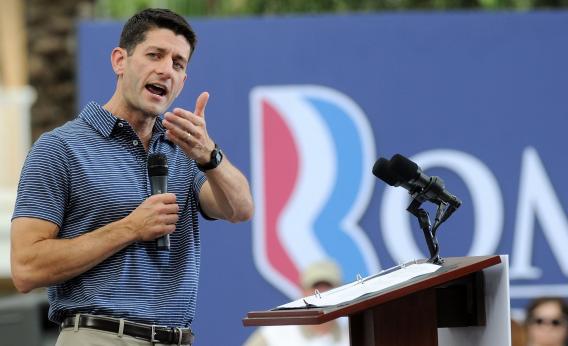In most countries, to be “fiscally conservative” means to worry a great deal about the budget deficit and debt levels—and to push these issues to the top of the policy agenda. In many eurozone countries today, “fiscal conservatives” are a powerful group, insisting on the need to boost government revenue while bringing spending under control. In Great Britain, too, leading Conservatives have recently proved willing to raise taxes and attempted to limit future spending.
The United States is very different in this respect. Leading politicians who choose to call themselves “fiscal conservatives”— such as Paul Ryan, now the Republican Party’s presumptive vice-presidential —care more about cutting taxes, regardless of the effect on the federal deficit and total outstanding debt. Why do U.S. fiscal conservatives care so little about government debt, relative to their counterparts in other countries?
It has not always been this way. In 1960, President Dwight D. Eisenhower’s advisers suggested that he should cut taxes in order to pave the way for his vice president, Richard Nixon, to be elected to the presidency. Eisenhower declined, partly because he did not particularly like or trust Nixon, but mostly because he thought it was important to hand over a more nearly balanced budget to his successor.
The framework for U.S. macroeconomic policy changed dramatically when the international monetary system broke down in 1971. The U.S. could no longer maintain a fixed exchange rate between the dollar and gold—the cornerstone of the postwar Bretton Woods system. The arrangement collapsed because the U.S. did not want to tighten monetary policy and run more restrictive fiscal policy: Keeping U.S. voters happy was understandably more important to President Nixon than maintaining a global system of fixed exchange rates.
Ironically, however, rather than undermining the predominant international role of the U.S. dollar, the end of Bretton Woods actually boosted its use around the world. Much has been written, and many hands wrung, about the dollar’s decline over the last four decades, but the fact remains that holdings of U.S. dollar assets by foreigners today are vastly greater than they were in 1971.
This turns out to be a mixed blessing, because it has allowed the U.S. to become less careful about its fiscal accounts. Foreigners now hold roughly half of all U.S. federal government debt, and they are willing to hold it when it yields a very low return in dollars (and even when the dollar depreciates).
In fact, whenever the world looks unstable, investors want to hold more dollar assets—even when the U.S. is the cause of the instability. When big U.S. banks are in trouble or Americans are having another debilitating political fight over their public finances, global investors scramble into U.S. Treasuries. Last year’s congressional showdown over the federal debt ceiling may have cost the country its AAA sovereign rating with Standard & Poor’s, but the federal government’s borrowing costs are actually lower now than they were then.
What has America done with this opportunity—arguably the lowest-cost funding in the history of humankind? Not much, in terms of productive investment, strengthening education, or maintaining essential infrastructure. But the U.S. has done a great deal in terms of adopting tax cuts that boost consumption relative to income and lower government revenue relative to expenditure. This is the lasting legacy of the Bush tax cuts.
And Americans have shifted greatly toward political philosophies—on the right and on the left —that regard public debt merely as a distraction. Or, as Dick Cheney put it, “Reagan taught us that deficits do not matter”— meaning that Ronald Reagan cut taxes, ran bigger deficits, and did not suffer any adverse political consequences.
Ryan and other Republicans undoubtedly want to cut the size of the federal government, and they have articulated plans to do this over several decades. But, in the near term, what they promise is primarily tax cuts: Their entire practical program is frontloaded in that direction. The calculation is that this will prove politically popular (probably true) while making it easier to implement spending cuts down the road (less obvious). The vulnerability caused by higher public debt over the next few decades is simply ignored.
For example, Ryan supported George W. Bush’s spending spree. He also supports maintaining defense spending at or near its current level—resisting the cuts that were put in place under the Budget Control Act of 2011.
The assumption here—unstated and highly questionable—is that the U.S. will be able to sell an unlimited amount of government debt at low interest rates for the foreseeable future. There is no other country in the world where fiscal conservatives would want to be associated with such a high-stakes gamble.
This article was originally published by Project Syndicate. For more from Project Syndicate, visit their new Web site, and follow them on Twitter or Facebook.
